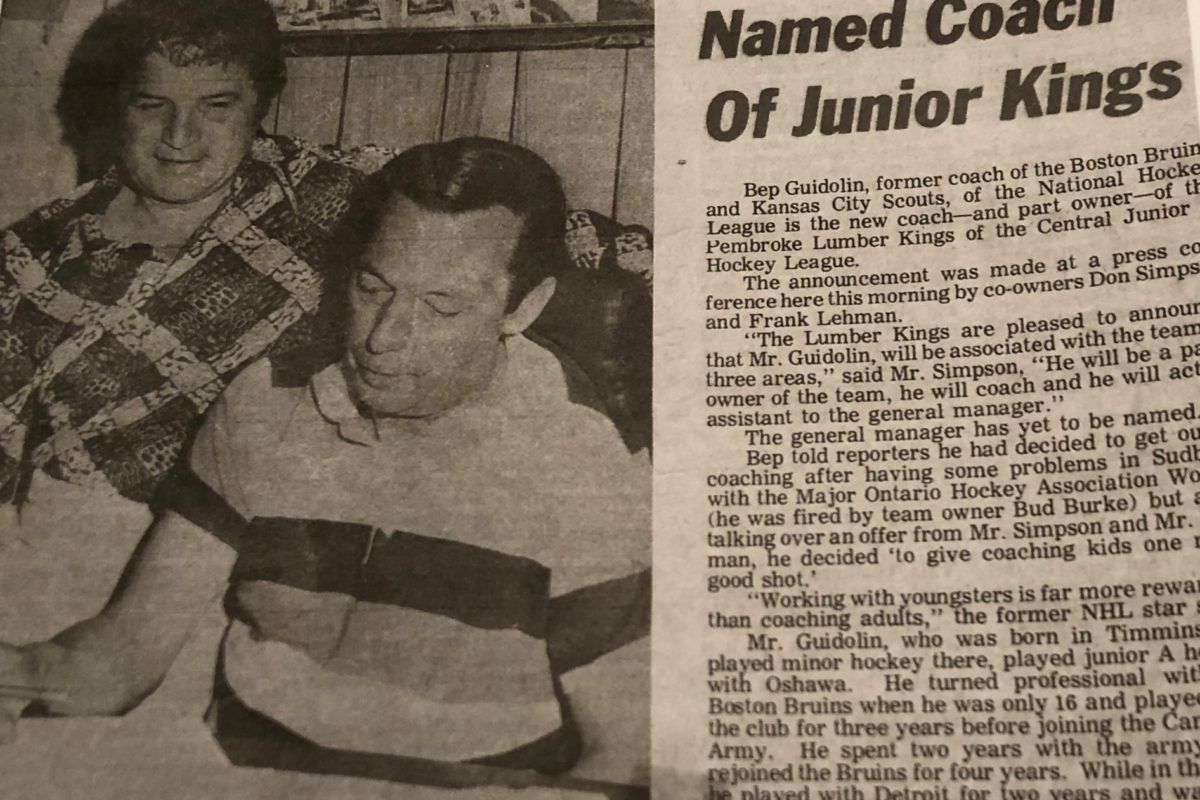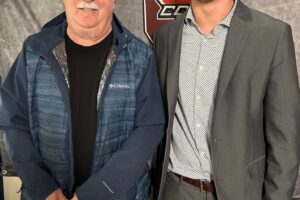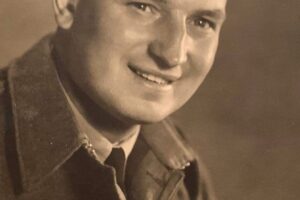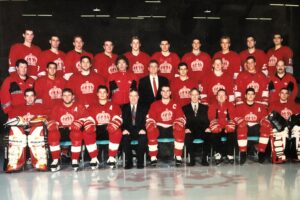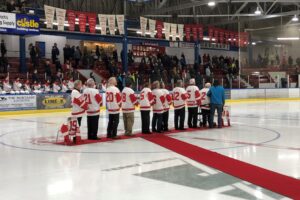In the spring of 1978 the Pembroke Lumber Kings were coming off a second consecutive league championship and another run at a Centennial Cup national title, but most of the headlines being generated by the club were about what was happening off the ice. The media firestorm that began as the Lumber Kings season ended would propel one of its victims to an NHL coaching career and would see a former NHL coach hit rock bottom in Pembroke.
Just minutes after the Kings were eliminated by the Guelph Platers in the Eastern Canadian Semi-Finals in Southern Ontario, Kings captain Warnie Richardson set in motion the firing of head coach Bryan Murray when he unloaded to Ottawa Citizen reporter Tom Casey a long list of grievances the players had with the team’s owners, Don Simpson and Frank Lehman. It was Richardson’s last game as a Lumber King as he was graduating from the junior ranks, and so he had little to lose by pulling back the curtain on a season of discontent that created a rift between the players and owners, with Murray caught in the middle.
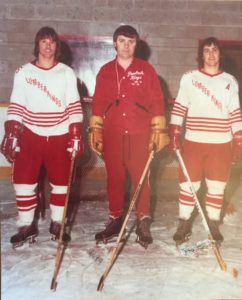
Among the list of complaints that Richardson leveled against the owners were that some players were owed bonuses, that the team bus had been without a heater and that during the Centennial Cup playdowms, the club had skimped on meal money. Richardson was quoted by Casey as saying,” We couldn’t even have second glasses of milk and desserts.”
Don Simpson was an outspoken owner with a big personality. He had been an owner of the team for five years, having had several partners, and he was never shy to say what was on his mind. He pressured Murray to speak out against what the players were saying, but when Murray refused, Simpson fired him.
Murray’s dismissal led to a war of words between the two men, with Murray holding the upper hand. He was arguably the top coach in the league. He had won a national Junior A championship with the Rockland Nationals in 1976, had taken the Lumber Kings to the Centennial Cup championship series in 1977 and had again taken the Kings deep into the national championship tournament in 1978.
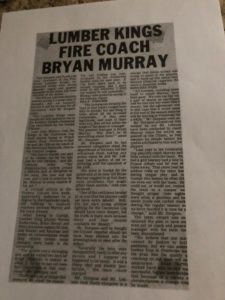
The criticism that had been directed at the owners had left Simpson livid. He told the Ottawa Journal, Murray was let go for not refuting published statements by Richardson, calling the remarks, “a lot of garbage.” Murray fired back, by saying, “The kids were telling the truth,” and wrote a long opinion piece to the Pembroke Observer in which he backed up several claims the players had made, advising he had no intention of returning to the Lumber Kings the following season.
Simpson had acted alone in firing Murray, leaving Lehman, out of the decision. Now, on the hot seat in a hockey crazed city, he needed to turn his attention to finding a “big name” to replace Murray behind the bench. He did, with the hiring of a coach who only four years earlier was two wins away from winning a Stanley Cup. How Armand “Bep” Guidolin found himself in Pembroke, dropping so quickly from being a NHL coach to the bench boss of a tier two junior A team is puzzling.
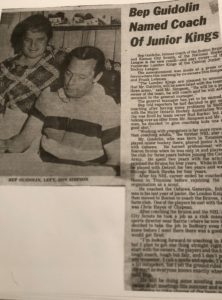
Guidolin was a blue collar coach, a principled man who was tough on players. He had made a name for himself by being the youngest player to ever play in a National Hockey League game. On November 12, 1942, at only 16 years of age, he had suited up for the Boston Bruins because the team was short of players during the Second World War. Too young to serve his country, Guidolin had been called up from the Bruin’s junior team in Oshawa. He had a solid NHL career, playing for about a decade but his involvement in helping to organize a player’s union made him a target of club owners. He finished his career in the minors.
After his professional playing career ended, Guidolin helped the Belleville McFarlands win an Allan Cup in 1958 as the top senior hockey team in the country. While playing with Belleville, Guidolin became familiar with Pembroke as the McFarlands had battled the senior Lumber Kings during the Allan Cup playdowns. When he was finished playing senior hockey, Guidolin began his coaching career in the Ontario Hockey Association with Windsor, London and Oshawa. By 1971, Guidolin had moved up the ranks to coach the Boston Bruins American Hockey League team, the Boston Braves. By the mid-way point of the 1972-73 season, Guidolin was brought in to turn the Bruins around after they sputtered under coach Tom Johnson.
In the spring of 1974 Guidolin’s Bruins were in the Stanley Cup Final against the bruising Philadelphia Flyers, who were trying to become the first of the 1967 expansion teams to win a championship. Despite having a loaded line-up of stars including Bobby Orr, Phil Esposito and Johnny Bucyk, the Bruins fell to the Flyers in six games. Guidolin thought he would get another shot at a Cup with Boston the following season, but when he ended up in a contract dispute with the Bruins, he bolted for Kansas City, signing a five year contract to coach the expansion Scouts.
It didn’t work out. Guidolin got into a squabble with Scouts General Manager Sid Abel and ended up leaving after only one season in Kansas City, a franchise that was struggling to stay afloat and would soon move to Colorado. Guidolin then landed with the Edmonton Oilers of the World Hockey Association, but again he was fired. Out of a professional coaching job, Guidolin accepted a major Junior A head coaching position with the Sudbury Wolves, but was let go half way through the 1977-78 season.
Simpson knew Guidolin was in a desperate situation, trying to stay in hockey as a coach. He reached out, offering Guidolin part ownership of the Lumber Kings, and on May 27, 1978 Guidolin was announced as the new head coach of the Kings. Guidolin really never made a firm commitment to coaching in Pembroke. He lived at a local hotel and Lehman says he never joined the ownership group. In fact, his stay with the Lumber Kings amounted to a cup of coffee.
After only six games behind the bench and with a record of 4 wins, 1 loss and 1 tie, Guidolin bolted Pembroke to coach the Philadelphia Firebirds of the American Hockey League. That coaching stint didn’t work out either and he never coached professional hockey again. Guidolin lived to 82 years of age and died in 2008.
Three years after being fired by the Lumber Kings and replaced by Bep Guidolin, Bryan Murray was coaching the Washington Capitals of the National Hockey League. Murray would have a very long and successful career as a NHL coach and general manager until his death in 2017 from colon cancer. He was 74.















